|
|
|
Sort Order |
|
|
|
Items / Page
|
|
|
|
|
|
|
| Srl | Item |
| 1 |
ID:
160885
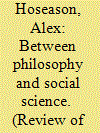

|
|
|
|
|
| Summary/Abstract |
As a discipline, IR returns repeatedly to the ‘problem of harm’; debating what harm is or should mean. Exploring the discipline through this lens allows us to understand it as contributing to a broader process of negotiation centred on harm as a principle of restraint. However, existing accounts of what harm means for IR are challenged by the scale and visibility of large-scale harm. This article attempts to push beyond recent accounts of harm by Linklater and Mitchell by examining their respective framings of the relationship between harm and its explanation in IR. Building on their limitations, I propose a framework centred on arguments for ontological realism and structure as a focus for explanation. The resulting ontology sustains the concerns of both while: (a) more fully characterising the relationship between explanation and values in IR; and (b) providing a more adequate account of the role of abstraction. In developing upon existing accounts, this article seeks to provide a stronger ground for the analysis of harm in IR. More broadly, it contributes to contemporary debates centred on the relationship between ontology and values with a view to clarifying the nature of explanation in IR as a social science.
|
|
|
|
|
|
|
|
|
|
|
|
|
|
|
|
| 2 |
ID:
160882
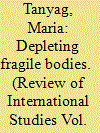

|
|
|
|
|
| Summary/Abstract |
In a crisis-prone world, the number of internally displaced persons (IDPs) uprooted by both armed conflicts and environmental disasters has drastically increased and displacement risks have intensified. Despite the growing attention within global security and development agendas to sexual and reproductive health and rights (SRHR), there remain striking gaps in addressing SRHR in crisis situations, particularly among IDP women and girls. This article examines the continuum between social reproduction in times of crisis and the material and ideological conditions that restrict women’s bodily autonomy in everyday life. Using the case of the Philippines where millions of people are routinely affected by conflict and disaster-induced displacements, it argues that the failure to recognise the centrality of women’s health and bodily autonomy not only hinders the sustainable provision of care and domestic labour during and after crisis, but also fundamentally constrains how security is enacted within these spaces. Thus, the article highlights an urgent need to rethink the gendered political economy of crisis responses as a building block for stemming gendered violence and depletion of social reproductive labour at the household, state, and global levels.
|
|
|
|
|
|
|
|
|
|
|
|
|
|
|
|
| 3 |
ID:
160887
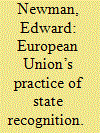

|
|
|
|
|
| Summary/Abstract |
This article explores the European Union’s (EU) practices of international state recognition in a transitional international order. It illustrates the difficulties that the EU has encountered in attempting to reach a collective position on sensitive cases of recognition – through a complex balance of internal and external considerations – at a time when the norms regarding recognition are increasingly under challenge. Whether the organisation takes a collective European position on recognition or allows its members to adopt individual national positions, acute inconsistencies and tensions have been exposed, with implications for the EU’s standing in the world. Through this, the article identifies a key tension between the EU’s normative commitments and its geopolitical interests. In conclusion, the article argues that while a uniform EU policy on recognition may not be feasible and case-by-case pragmatism will likely continue, a more coherent approach and greater understanding of the impact of the EU’s position on recognition are necessary. The article draws upon interview material and extensive analysis of official EU documentation in order to provide new insights into this complex challenge. By exploring the intricacies of recognition politics, the article also makes an empirical contribution to understanding the practice of international relations in this area.
|
|
|
|
|
|
|
|
|
|
|
|
|
|
|
|
| 4 |
ID:
160880
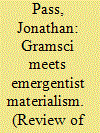

|
|
|
|
|
| Summary/Abstract |
Neo-Gramscians have made invaluable contributions to expanding traditional IR/IPE theory. Nevertheless, as the following article indicates, the ontological, epistemological, and methodological positions they adopt results in a rather one-sided interpretation of Antonio Gramsci and a partial, at times erroneous, account of the nature of the current global system. In highlighting these oversights, the neo neo-Gramscian approach presented here – rooted in a critical realist philosophy of science, specifically ‘emergentist materialism’, and involving a more complete reading of Gramsci – seeks to lay the basis for the elaboration of a more convincing theoretical and conceptual framework to analyse the changing dynamics of contemporary world order, without which the Coxian critical theory dream of engendering social emancipation cannot be fully realised.
|
|
|
|
|
|
|
|
|
|
|
|
|
|
|
|
| 5 |
ID:
160883
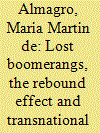

|
|
|
|
|
| Summary/Abstract |
This article aims to show the added value of studying transnational advocacy networks through a discursive approach in order to better understand the outcomes of norm diffusion in postconflict contexts. I argue that constructivist approaches to norm diffusion fall short as an explanation of norm adoption because they assume an automatic process of norm propagation through socialisation mechanisms. The first goal of the article is then to discuss how the internal dynamics of discourse negotiation in transnational advocacy networks impact the diffusion and implementation of international norms. The second goal is to propose the concept of the rebound effect and to explore the conditions under which it takes place. Through data collected during extended fieldwork, the article examines a prominent case, namely the transnational campaign for the implementation of United Nations Security Council Resolution 1325 on Women, Peace, and Security in Burundi and Liberia. I ask why and how the campaign was understood as a success in Liberia and as a failure in Burundi. I argue that there is another way of looking at these cases in less dichotomised ways. Crucially, my findings demonstrate how in both cases a very particular discourse on gender security is (re)produced through power relations between local and transnational activists limiting the type of policies that are advocated for and depoliticising the grassroots.
|
|
|
|
|
|
|
|
|
|
|
|
|
|
|
|
| 6 |
ID:
160886
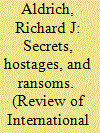

|
|
|
|
|
| Summary/Abstract |
Britain has long taken a firm public line against terrorist ransom, insisting that yielding to terrorist demands only encourages further acts of intimidation and kidnapping. Hitherto, academic research has tended to take these assertions of piety at face value. This article uses a historical approach to show that the British position has shifted over time and was often more complex and pragmatic. Indeed, Britain’s position with regard to kidnap and ransom insurance has, until quite recently, been rather ambiguous. We use the British case to suggest that, rather than dividing states into groups that make concessions and those that do not, it is perhaps better to recognise there is often a broad spectrum of positions, sometimes held by different parts of the same government, together with the private security companies that move in the shadows on their behalf. One of the few things that unites them is a tendency to dissemble and this presents some intriguing methods problems for researchers.
|
|
|
|
|
|
|
|
|
|
|
|
|
|
|
|
| 7 |
ID:
160884
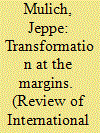

|
|
|
|
|
| Summary/Abstract |
Taking the phenomenon of empire as its starting point, this article seeks to provide a framework for addressing the question of how and why international systems change over time. Synthesising elements from network-relational analysis and practice theory, I argue that international systems are best thought of as being composed of multiple partially overlapping and interrelated hierarchical networks. These networks are made up of social ties – as in classic network analysis – but also of specific repertoires of practice. Systemic transformations happen through the reconfiguration of networks, both through shifts in social ties and through changes in their practices. Empire provides a particularly illuminating window into the topic of systemic change, in part because a major driver of historical transformations has been the expansion of empires and their encounters with other heterogeneous polities across the globe, and in part because a focus on imperial interactions highlights the limitations of existing unit-centric perspectives. Drawing on examples from the nineteenth century, I illustrate the usefulness of the framework by showing how different regionally anchored systems came into contact with the expanding spheres of Western empires and how such points of interaction contributed to the development of an increasingly global international system.
|
|
|
|
|
|
|
|
|
|
|
|
|
|
|
|
| 8 |
ID:
160881


|
|
|
|
|
| Summary/Abstract |
The article examines the roles of NGOs in banning cluster munitions that resulted in the 2008 Convention on Cluster Munitions and the campaign against landmines in the 1990s. It argues that NGOs have managed to move questions about the use of force from the closed decision-making sphere of military commanders and arms control diplomats into open public debate. Thus NGOs have simultaneously desecuritised the use of force by states, securitised certain weapons technologies, and made human beings the referent object of security. This has marked a shift from state security and strategic disarmament to human security and humanitarian disarmament, without fundamentally challenging the laws of war. However, in contrast to realist views that only militarily useless weapons ever get banned and radical critical perspectives that see new legal regimes as legitimating war and US hegemony, I argue that NGOs have engaged in immanent critique of military arguments and practices based on prevailing principles of international humanitarian law. The resulting weapon ban treaties have both restrained US policy and undermined its legitimacy. The article explores the discursive choices that underpinned the remaking of the security agenda by NGOs and their role as de/securitising actors and emancipatory agents of change.
|
|
|
|
|
|
|
|
|
|
|
|
|
|
|
|
|
|
|
|
|